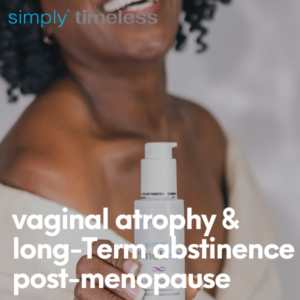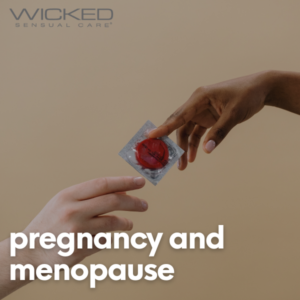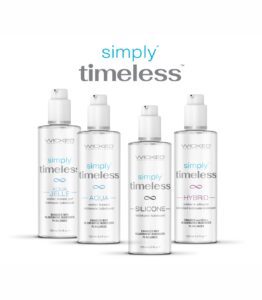Vaginal Atrophy and Long-Term Abstinence Post-Menopause: Safely Resuming Sexual Activity
If you’ve been celibate for a while during or post menopause, the thought of resuming sexual activity might feel a little intimidating. Maybe you’ve wondered, “Will it hurt? Is my body capable of enjoying intimacy again? How do I bring this up with my partner—or my doctor?” You’re not alone in these feelings. For many people, menopause and long-term abstinence bring changes to their bodies that can feel confusing or even frustrating. But here’s the good news: intimacy doesn’t have to be off the table.
 With a little patience, self-care, and the right tools, you can rediscover pleasure, and desire, at your own pace. Whether you’re exploring solo or rekindling a connection with a partner, this is an opportunity to embrace your needs and nurture your body.
With a little patience, self-care, and the right tools, you can rediscover pleasure, and desire, at your own pace. Whether you’re exploring solo or rekindling a connection with a partner, this is an opportunity to embrace your needs and nurture your body.
In this guide, we’ll talk about vaginal atrophy, how it can affect intimacy after menopause, and practical steps to make your transition back to sexual activity safe and enjoyable. Along the way, we’ll introduce the Wicked Sensual Care simply® timeless™ line, designed specifically for menopause-related needs, and share expert tips for caring for yourself, communicating with your doctor, and rekindling intimacy with confidence.
Because no matter how long it’s been, your pleasure matters—and it’s never too late to prioritize it.
What Is Vaginal Atrophy?
Vaginal atrophy, or genitourinary syndrome of menopause (GSM), is a common condition that occurs as estrogen levels drop during menopause. This hormonal change can cause the vaginal walls to become thinner, drier, less flexible, and more prone to irritation. If untreated, vaginal atrophy can lead to:
- Vaginal dryness and itching
- Pain during sex (dyspareunia)
- Spotting or bleeding after penetration
- Increased risk of urinary tract infections
This isn’t a reason to lose hope—there are many effective treatments and approaches to overcome these challenges and safely return to a fulfilling sex life.
How Does Long-Term Abstinence Impact Vaginal Health?
If you’ve gone a long time without penetrative sex, you might notice additional changes:
- Decreased Elasticity: The vaginal tissues may become tighter and less flexible due to reduced blood flow and infrequent stretching.
- Shortened Vaginal Canal: The vaginal canal may narrow or even shorten slightly without regular activity.
- Heightened Risk of Discomfort: Resuming sexual activity without preparation can lead to vaginal shearing or tearing.
- Decreased Desire for Intimacy: These complex symptoms may cause desire for intimacy to wane. Once you stop feeling desire, it’s hard to prioritize sexual pleasure. By focusing on mental and intimate well-being, it’s possible to incorporate desire back into your life.
While it may feel daunting, the good news is that these changes are reversible with care and consistency.
Tips for Safely Resuming Sexual Activity
Here are practical, step-by-step tips to prepare your body and mind for comfortable intimacy:
1. Communicate with Your Doctor
A conversation with your healthcare provider is a great first step. Be open about your concerns, including any pain, dryness, or worries about vaginal shearing. Here are some helpful tips for discussing this topic with your doctor:
- Be Specific: Describe any symptoms you’ve noticed, like dryness, itching, or discomfort.
- Ask About Options: Inquire about treatments such as vaginal moisturizers, estrogen creams, or prescription therapies like DHEA.
- Mention Long-Term Abstinence: Let your doctor know you’re considering resuming sexual activity so they can tailor their recommendations.
For more advice on discussing these issues with a healthcare professional, visit the Cleveland Clinic’s guide on vaginal atrophy.
2. Start a Vaginal Health Routine
Caring for your vaginal tissues is just as important as any other part of your body. Make it part of your daily routine with these steps:
- Use a vaginal moisturizer every few days to improve hydration.
- Incorporate dilators to gradually stretch the vaginal tissues.
- Consider pelvic floor exercises, like Kegels, to improve blood flow and muscle tone.
3. Reintroduce Sexual Activity Gradually
Rushing into penetration can cause pain or injury. Instead, ease into intimacy with these methods:
- Solo Exploration: Start with self-stimulation using lubricants and gentle vaginal toys, such as wands or small vibrators.
- Dilator Therapy: Medical-grade dilators can help stretch the vaginal canal over time.
- Communicate with Your Partner: If you have a partner, discuss pacing and explore other forms of intimacy like massage or oral sex while building your comfort with penetration.
Janet Brito, an AASECT-certified sex therapist, recommends making this process enjoyable rather than a chore. Treat it as self-care—your pleasure matters. Learn more in this Healthline article on post-abstinence sex.
4. Redefining Intimacy: It’s About What Feels Right for You
 Intimacy doesn’t have to revolve around penetrative sex—it’s about connection, pleasure, and comfort, however you and your partner define it. For some, resuming penetrative sex may be a goal, while others may find equal joy and fulfillment in different forms of physical or emotional closeness. And that’s okay. You have permission to choose what works best for your body and relationship, without guilt or pressure.
Intimacy doesn’t have to revolve around penetrative sex—it’s about connection, pleasure, and comfort, however you and your partner define it. For some, resuming penetrative sex may be a goal, while others may find equal joy and fulfillment in different forms of physical or emotional closeness. And that’s okay. You have permission to choose what works best for your body and relationship, without guilt or pressure.
Intimacy can take many forms: a lingering hug, a shared laugh, a sensual massage, or even simply holding hands. If penetrative sex doesn’t feel right for you—whether for now or forever—know that this decision is entirely valid. What matters most is creating a space where you and your partner feel safe, loved, and connected in ways that honor both of your needs.
Why Lubricants Matter for Post-Menopausal Sex
Lubricants are your best ally when it comes to reducing friction and making sex comfortable and pleasurable. Products like Wicked Sensual Care’s simply® timeless™ collection are designed specifically for menopausal needs. Here’s why they stand out:
- Hydration: Ingredients like aloe and sodium hyaluronate provide long-lasting moisture.
- Gentle Formulas: Free from ingredients like parabens and glycerin, these lubes are perfect for sensitive skin.
- Versatile Options: The simply® timeless™ line includes water-based, hybrid, and silicone formulas to suit different preferences.
Recommended Products:
-
- simply® timeless™ Aqua: A lightweight, hydrating water-based lube for everyday comfort.
- simply® timeless™ Hybrid + DHEA: Combines the best of water and silicone with added DHEA for tissue support.
- simply® timeless™ Silicone: Perfect for long-lasting glide during extended intimacy.
- simply® timeless™ Aqua Jelle: Extra-thick formula that stays where you put it.
For a closer look at these products, visit the simply® timeless™ collection.
Talking to Your Partner About Vaginal Atrophy
Open communication with your partner can strengthen your relationship and reduce anxiety about resuming intimacy. Consider these tips:
- Be Honest: Share how menopause and abstinence have affected your body.
- Set Expectations: Let them know that patience and understanding are key as you reintroduce sex.
- Explore Together: Try using lubricants or introducing sex toys together to make the experience enjoyable for both of you.
If this conversation feels difficult, consider seeing a sex therapist or counselor to facilitate the discussion.
What to Expect When Resuming Sex
Resuming penetrative sex after a long period may feel different at first, but that’s okay. Here are some things to expect and how to address them:
- Mild Discomfort: This is normal but should improve with the use of lubricants and dilators.
- Spotting or Minor Tearing: If this occurs, pause and consult your doctor.
- Increased Confidence: Over time, as your body adjusts, you’ll feel more comfortable and confident.
Self-Care for Vaginal Health
In addition to using lubricants, here are other ways to maintain vaginal health:
- Avoid products that may irritate sensitive tissues, like bubble baths or scented soaps.
- Stay hydrated and eat a balanced diet to support overall skin elasticity.
- Engage in regular physical activity to boost circulation and mood.
 A Note on Safe Sex
A Note on Safe Sex
Even after menopause, practicing safe sex is important if you or your partner have other partners. Use condoms to protect against sexually transmitted infections (STIs), as vaginal atrophy can make tissues more prone to small tears that increase the risk of infection.
Moving Forward with Confidence
Rediscovering intimacy after a long pause may feel overwhelming, but you don’t have to navigate this alone. With the right tools, communication, and support, you can create a fulfilling and pleasurable sexual experience post-menopause.
Wicked Sensual Care’s simply® timeless™ collection is here to help make the journey smoother, addressing dryness and sensitivity with products designed specifically for menopausal needs. Don’t be afraid to ask your doctor questions, explore solo intimacy, and prioritize your comfort every step of the way.
For more resources and information, visit the Wicked Sensual Care Menopause Hub. Your body deserves care, and your pleasure is worth celebrating.
Share with your friends:
Subscribe to the Wicked Sensual Community Newsletter!



